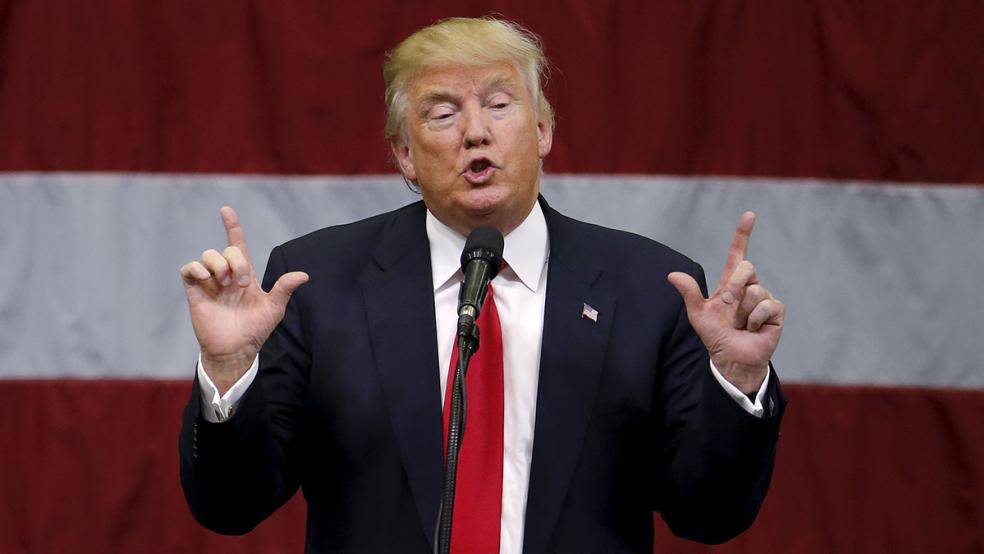When the guy you support for the Republican presidential nomination has publicly disavowed a pledge he signed promising to support the party’s eventual nominee and to not run as a third party candidate, it may seem like a stretch to demand that his delegates to the nominating convention sign a loyalty pledge promising to support him even after they are no longer required to do so.
But it’s 2016. Irony died a long time ago in this race and shame headed for the door sometime around the first GOP debate. So yesterday, Donald Trump supporter Roger Stone felt no compunction about demanding, in a column published by Breitbart last night, that delegates won by Trump “sign a pledge that ‘they will remain committed to vote for the winner of the primary or caucus as chosen by the voters (Donald J. Trump )’ through the entire balloting process. In other words, respect the will of the voters.”
Related: Republicans Gear Up for Convention Chaos as Loyalty Pledge Breaks Down
Stone, a former dirty tricks specialist in the Nixon administration and a well-known political provocateur, has been an unofficial adviser to the Trump campaign since last summer. He has spent the last few weeks aggressively promoting the idea that shadowy forces within the Republican establishment are aligning against Trump, and plotting to deny him the GOP nomination through trickery at the convention.
“The fix is in,” Stone wrote. “The same insiders who have nearly destroyed the Republican Party are at it again, plotting in a backroom deal to block Donald Trump’s nomination as the GOP candidate for president. Trump has played by the rules and he’s winning big--fair and square. This lobbyist-led plot was concocted by the donor class and others who have bought and paid for the allegiance of the dishonest brokers of the Republican Party.”
What is actually happening is that the Ted Cruz campaign is aggressively working the GOP’s system for selecting delegates, and successfully having his own supporters named as delegates even if they are committed to voting for Trump on the first one or two ballots. The aim is to engineer a giant swing to Cruz when delegates are released from the requirement that they support a particular candidate.
Stone has been warning about these “Trojan horse” delegates, and his aim with the pledge is to block them from switching or, more likely, to identify actual Cruz supporters among pledged Trump delegates by seeing who refuses to sign. However, it’s far from clear that he will be successful without simultaneously damaging the Trump campaign.
Related: Trump Doesn’t Even Inspire His Own Family Very Much
Loyalty pledges have a checkered recent history in U.S. politics. The most well-known and arguably the most successful of them was the promise that anti-tax activist Grover Norquist convinced a large majority of Republican lawmakers to sign pledging that they would, under no circumstance, raise taxes. The pledge was effective in achieving its goal for years -- but critics say it handcuffed Congress in a way that made reasonable debate about taxes and necessary changes to the tax code impossibly difficult.
During the 2004 presidential campaign, attendees at some rallies for President George W. Bush were asked to swear a loyalty oath as a condition of entry, in order to weed out protesters or political opponents. The move allowed opponents of the president to characterize him as afraid to face crowds that weren’t pre-screened.
The loyalty pledge signed by all of the Republican presidential candidates in this cycle was actually a transparent effort to forestall any move by Trump to use his early popularity in the race to subvert a future nominee or strike out as an independent if he were to lose.
Related: Cruz Slams Trump as a Wannabe ‘Mobster’
The pledge backfired on the party, however, because while Trump clearly didn’t feel bound by it, it forced his opponents to continue pledging their support to the billionaire even as he made outrageous statements about ethnic and religious minorities and pledged to torture suspected terrorists.
The effectiveness of a pledge, of course, is tied to the idea that there will be consequences for breaking it. But a pledge circulated by Stone’s “Stop the Steal” organization would have no legal weight. And given Trump’s own disregard for loyalty oaths, it wouldn’t carry much moral weight, either.
What it would do is identify individual delegates for the kind of abuse from Trump supporters -- including death threats -- that state-level Republican Party officials have been enduring in recent weeks. If hundreds of real or accused “Trojan horse” delegates start getting attacked by Trump’s largely anonymous online mob of Twitter and Facebook followers, the blowback against him would likely be severe.





